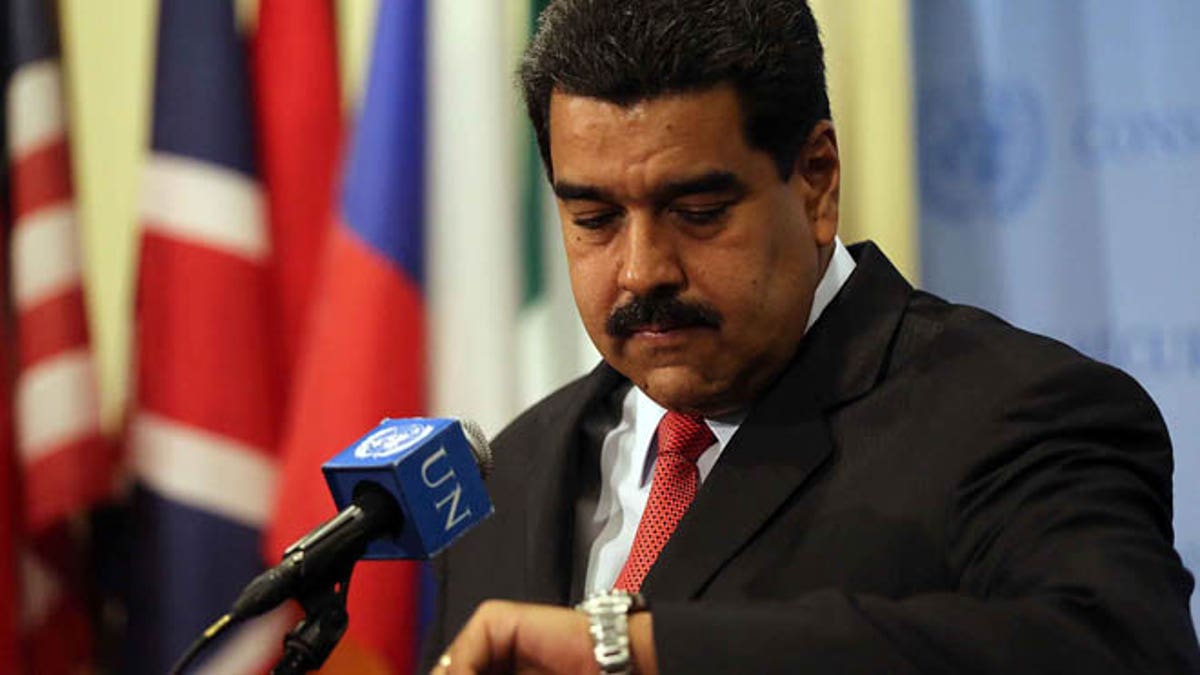
Venezuelan President Nicolas Maduro on July 28, 2015 in New York City. (2015 Getty Images)
Caracas – Not that long ago, no Latin American country messed with Venezuela. At one point most if not all Central and South America looked up to it and followed its rogue lead against the so-called U.S. Yankee Empire.
Oh, how things have changed.
After years setting the political tone across Latin America, the influence of Venezuela’s Chavismo is clearly winding down and seems headed to a bitter end.
In the last couple of months, two of Venezuela’s closest allies in the region – Argentina’s Cristina Fernandez de Kirchner and Bolivia’s Evo Morales – have been beaten or severely damaged in the polls, while one-time beacon Cuba is now closer than ever to the U.S.
This, added to the free fall of oil prices and the acute economic crisis, has undermined the country’s longtime revolutionary standing to the point that the foreign policy strategies put in motion in 1999 are now all but unviable — or absurd.
Some in the opposition are hopeful that while the region continues to pivot to the right and the country continues to crumble, Nicolas Maduro’s government will be forced to introduce important changes at the domestic level.
Political analyst Javier Corrales says that over the past decade Venezuela became dependent of an “Alliance of Tolerance” with other countries, which allowed it to get away with its domestic nondemocratic actions and avoid international sanctions.
One big part of that alliance, he further explained in a paper published last year on the Journal of Democracy, relies on the exportation of the country’s ideological model and the establishment of financial ties with regional allies. The latter was built through economic aid – and thanks to the once favorable oil prices – to foreign countries, especially small and poor Caribbean islands (think Saint Vincent, St Kitts and Neves, St Lucia) whose votes in the Organization of American States usually block any move against Venezuela.
But those days are gone. “After a decade, the balance has shifted in the region because the country’s socialism failed to change the people’s life for good,” said Milos Alcalay, former Venezuela ambassador to the United Nations from 2000 to 2004. “That’s why they are turning to the right.”
On the other hand, the financial crisis has forced to turned off the tap of foreign aid channeled through institutions especially created to that end — namely Petrocaribe, which sells oil to allies under preferential conditions of payment, and the Bolivarian Alliance for the Peoples of Our America (ALBA), an 11-country alliance based on the idea of the social, political and economic integration.
“The ALBA is almost useless today, but with Petrocaribe Venezuela is more careful because of the enormous influence it has over the decision-making in the OAS,” foreign affairs and trade analyst Felix Gerardo Arellano told FNL.
He pointed out how, in 2014 for instance, when hundreds were arrested and more than 40 people were killed in riots against the government, the OAS ignored the issue because Caribbean islands blocked a vote to bring it up for discussion at a plenary session.
Arellano also said that Venezuela’s only wildcard to keep its sway in the region is the debt the ALBA countries accumulated over the last decade buying cheap oil.
But the political landscape is slowly changing and some say a situation similar to the 2014 riots would not be received passively by the international community.
“The government abuses and disaster are bigger every day and that makes it hard for other countries to be tolerant,” Corrales told FNL.
He said the more right-leaning forces across the region are starting to use the situation to their advantage. Argentina’s new president, for example, heavily criticized Venezuela during his campaign last year.
The new reality is also impacting the relationship, once shattered, between the internal opposition and Chavismo’s former allies such as Brazil.
When a delegation of lawmakers from the National Assembly Foreign Policy Committee visited [Sao Paulo?] last week, it was received by the minister of Foreign Affairs, Mauro Viera.
“It was one of the most successful international trips the opposition has made in years,” said Congressman Luis Florido, head of the committee, to FNL.
He said these approaches are important in case a political change materializes in the following months or years.
“The [members of the] opposition have to show clearly that they have a political plan for the country so they can build confidence abroad,” Arellano said. “This will also increase international pressure on the current government to negotiate with their political rivals.”




















